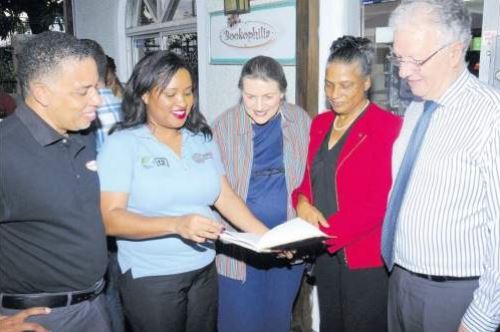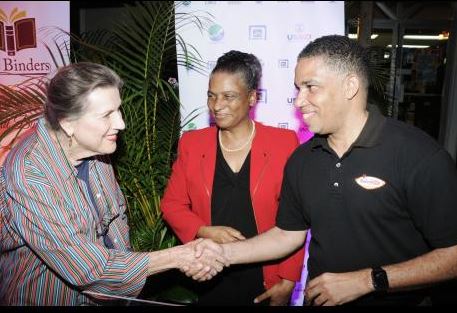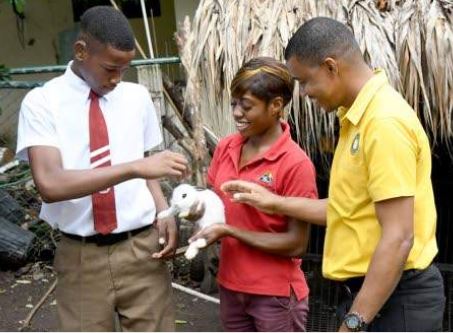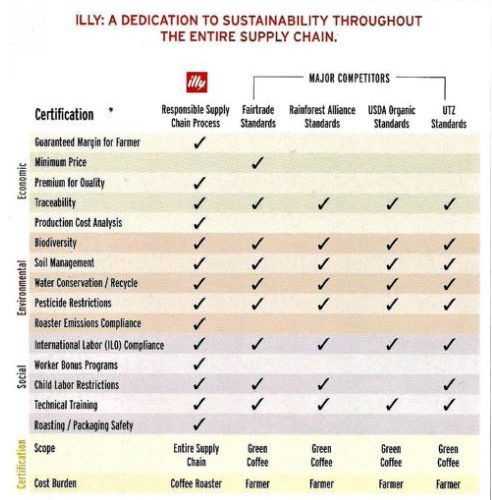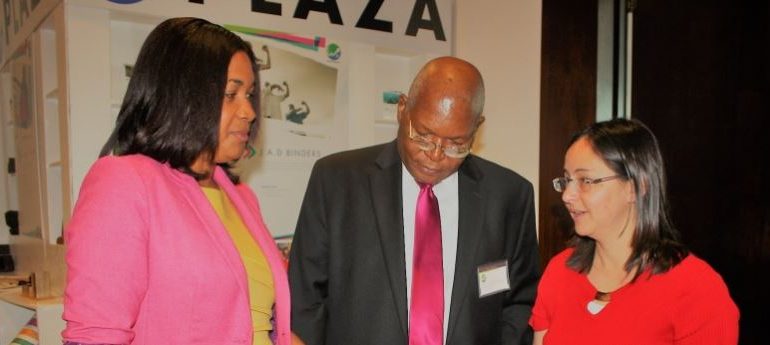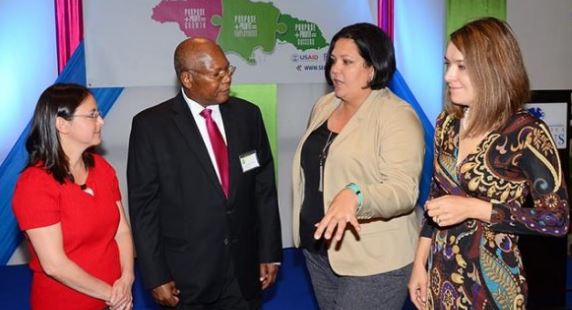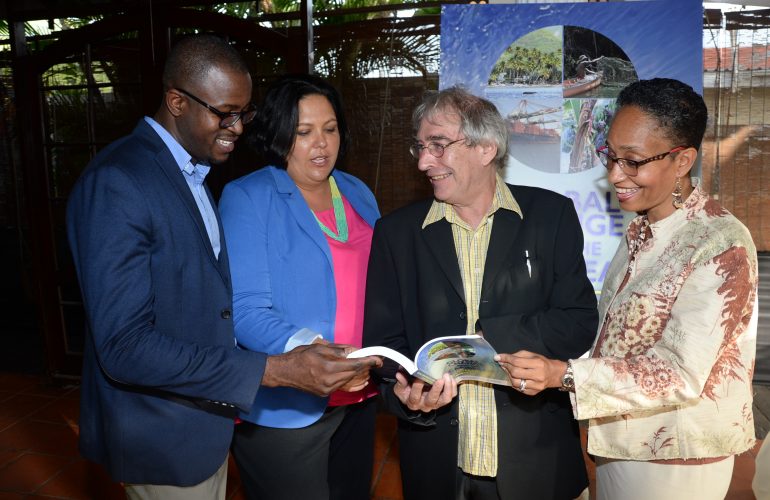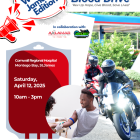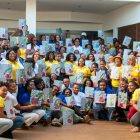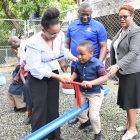hello, my name is blake and along with my wife, tashi, a year and a half ago we established deaf can! coffee we are a not-for-profit social enterprise aiming to engage, equip and empower deaf youth. deaf can! coffee started just by taking our students on a field trip to meet clarke who is a deaf coffee farmer in st. elizabeth.
is coffee roasting business profitable, and if you meet clarke you will never forget him, because he is a character. clarke is 78 years old and has grown and roasted coffee on a little farm in st. elizabeth his whole life. as a family friend of my wife’s, who grew up around clarke, we said “hey, let’s take our students to clarke’s farm in st elizabeth to meet him and see if they wanted to learn more about coffee.
because at that time we just wanted to expose our students to a role model, to someone who is doing something as a deaf person. well the kids got so excited about coffee they came back to kingston and said “hey, can we roast coffee like clarke?” we said “well we can try that!” and so we got this little tabletop roaster that roasts a half pound of coffee. we got some green coffee from clarke and started roasting… and pretty soon they boys said “can we taste the cofffee?” so we found a mr. coffee machine that was sitting on our shelf, cleaned it up and they started brewing coffee. and then when people came by the school they would ask “do you want to taste our coffee?”
and they would taste the coffee and say “wow this is really good” and we’d say “of course, it’s fresh roasted!” it’s gotta be good! and then people said “can we pay you for this coffee” and we said “ok” so it just organically grew. because the boys were really doing everything as a group and as they started selling coffee to customers their smiles got a little bigger, they started taking pride in it and feeling affirmed with positive attitudes about themselves. about a year ago in march we decided to not just roast coffee but to start a little coffee shop here on campus. after three months of running it here at the school we realized this had the potential to actually employ people. this has the potential to go beyond the walls of this campus.
and so in july of last year we actually registered deaf can! coffee as a business name and started the process of developing ourselves as a legal entity. the name, deaf can! coffee, as i look back on it, just have to say…”god knew what we needed!” we never really had a lot of discussion, we never did a lot of thinking about what the name was going to be. we just talked with the boys groups, the boys only bible study group that this all started from, and asked “what do you want the world to know? what is going to be the core of your being moving forward?” and they said “we want people to know that we can!” and so we wrote out on the board “deaf can! coffee” and then it wasn’t until a few months later we registered the name, when we felt it was right to move forward.
but, you know, it just kinda happened. because the boys that’s the message they want to share with the world is that they can do anything. so deaf can! coffee was the resulting name. when we started we had no idea we were going to have a business, it just started as a project to give our kids a little bit more confidence. we started with just roasting coffee, we were roasting and bagging it, and then selling it. from there we started doing espresso based drinks and lattes, cappuccinos and then some people said, some people said “well, ya know, it’s hot here, some people will want cold drinks,” and we said absolutely. so the boys saved up their own money and bought a blender and started doing frappes. and then someone said “let’s blend up some fruit” and so they started doing fruit smoothies.
and then someone said “we want a milkshake” and so they started making milkshakes too. right now they’re working a “roots” drink, using fruits and vegetables and blending those up to make a really healthy drink. this is nitro cold brewed coffee… what we have is a keg and inside is cold brewed coffee. i think we’re the only people in jamaica doing nitro cold brew coffee, which is cold brewed coffee put into a keg pressurized with nitrogen, which infuses with the coffee, and then served on tap. so we compare it to guinness and tell people we have “guinness coffee”. tastes almost like there is creamer in the coffee, it’s delicious! we started entrepreneurial business education with grades 9, 10 and 11,
and they came up with their own recipe for bottled cold coffee and added vanilla flavouring. it’s an energy drink that’s bottled, you can just grab it and go. we do anything with coffee, whether its hot or cold, anybody can come here and get something they want. we’ve had multiple people who are coffee connoisseurs come in here and say this is the best coffee they’ve had in jamaica. and we’ve also had people come in here who say “coffee? i don’t want coffee, it’s gross.” and so we’ll serve them something else and they’ll find something they like. whether you are a coffee purists or want something sweet or want a fruit smoothie, something healthy or something refreshing, to keep you going, we have something for you.
and so i feel we can match most demographics and most market segments. our tagline that we operate by is engage.equip.empower. my wife, being a deaf jamaican herself, has grown up and seen a lot of people try to “help” deaf people. and often their approach to “helping” is by giving them things, then wait to see what the deaf person did with it. inevitably nothing would really last and then they would walk away saying “oh the deaf person can’t do it.” and so we started with a basic principle that our students have to be “engaged” and have ownership in it. and so we encouraged them to save up their own money from sales to buy better equipment. so they bought their first espresso machine and grinder, and it continued to grow with their own participation. that, for us, is engagement.
once they’re engaged and have a sense of ownership and want it, then they need the skills taught to them. that’s when we partnered with various coffee shops and sidecar coffee from the us was our first critical partner. they were willing to come down here and put on an intensive, two-day barista training workshop. and 17 of our boys got certified as a level 1 barista. and from there it has just continued to take off, when they need funding, they save up their own money. they have objectives and goals for what they want to save up for next and they save up and then go get it. when we built this training centre, because as we saw the growth that happened in the first 4-6 months of the small coffee shop we realized that there was so much opportunity because the kids wanted to learn more. and so we reached out to the digicel foundation, here locally, and said we have this vision, this dream to have
a cafe training centre. they came and did a site visit, loved what we were doing and came alongside of us. digicel foundation gave us a j$3.5 million grant to build the space that we are in right now. we also received funding locally from harvestcall jamaica, which is the not-for-profit that my wife and i operate here in jamaica, which does things outside of the deaf schools, we also work with children’s home and infirmaries and hospitals. but my wife doesn’t want to see us going out and looking for a lot of donations or freebies, because our students need to have ownership. they need to feel involved as a part of the business. the business side of it though that goes mobile, that goes out to public events, is really self-sustaining. we don’t look for outside funding for that because its important for our young men to feel that it’s theirs. we are making a profit, but again because we are operating within a school setting and we’re training them
there’s not a lot of wages or salaries, we’re not paying full-time workers, so we don’t have the overhead that a traditional business would have. or as we grow and go out into the public, we will eventually have that. we don’t have opening public hours now, we don’t want people just randomly coming off the street. we have children here at the school and need to make sure they they’re taken care of and protected. so we can’t have strangers coming in. but we do have people that find out about us and show up at the gate. and if we are here, we’ll gladly open up and serve them, but moving forward we’d like to have a public space. then the general public can just go there, to an off-site location. one of our goals from the very beginning was to create community because that’s one thing our deaf youth lack in their lives, is community, that they really feel a sense of belonging.
so from the beginning we wanted to really nurture that, and make sure that we protected it, and make sure that the boys it started with, that it was theirs. but then as it grew, deaf adults started hearing about what we were doing, and so we started getting interest from outside people saying “i’ve heard about deaf can! coffee, i’m deaf, can i get involved? we’re not out there actively seeking people, they are coming to us and through that we can filter it and determine who really want to learn versus someone discontent with life and just want something easy. because one of the key principles that our boys understand is that you have to work hard. building a business is hard work. you have to be committed and work together as team. through that we’ve developed carlyle and fabian, the manager and assistant manager, where they’re
really the leaders moving forward. they know who to contact if we need somebody else. we have deaf culture already in existence, which has its own set of norms and values. and we incorporate those fully into the business, which means things have to be visually friendly. things have to be spacial. in our training centre here, everything is open. so we can have a group of kids in a semi-circle where it’s visual. everyone can see everything and they can communicate clearly. so everything we do is in a semi-circle and in the open. that’s a cultural value from deaf culture and then within our business culture we’re creating an emphasis on inter-dependence.
first we very dependent on others, as an infant. when we get into our teen years we want to be very independent and we don’t want anyone to tell us anything. but as an adult, you realize you have to be both, you have to be dependent and independent. and that’s interdependence. don’t just focus on an area that you are good at and try to become the best. rather try to raise up your peers. and through that they are working together. and that’s what we want to embody within our culture, that it’s all about the team. and if one person fails, then we all fail. the concept of entrepreneurialism is not something that our students had a strong grasp of before we started.
but as they’ve grown their own business, they’re starting to realize what being an entrepreneur is all about. mostly it’s about learning and one of the things they’ve learned the most is that you have to take risks. you have to be calculated, you can’t be foolish, but you have to try something too. we’re seeing more creative thoughts coming out of them in ways that we never really anticipated. we’re seeing artistic sides of our students coming out when we’re talking about marketing. thinking “how can we make this more visually appealing?” we actually had a young deaf man design a hand-sketch for our new logo for the bottled cold coffee energy drink. then we sent it to justin forbes, who is a deaf graphic artist here in kingston, and he developed the full logo. now it’s digital and we print that for the bottles today.
in a lot of ways entrepreneurialism is effecting the way they think, to realize that inside of every one of us we have creative capabilities. we all have ideas, they just need to be tapped in to. we believe deaf can! coffee can go anywhere. if you ask our boys, they’ll say “we’re not just thinking about jamaica, we want to see deaf can! coffee all over the world.” one of the reason for that is 90% of the coffee is grown in third world and developing countries. and in those countries you will by default have less government programs and less intervention and lower educational standards for deaf people. and so you could literally go into most coffee producing countries and already there will be a disenfranchised
and at-risk deaf community, and you can go into that and engage them in the business. once it’s a deaf person going into that area training and teaching, deaf people by nature will flock to it. the deaf community throughout the world may not share the same language, but they share cultural values. our guys could literally go to another country and walk around with a deaf can! coffee sign and deaf people will come and want to know more. and you can engage people through that process. and once they’re engaged and want it, then you can equip them with the skills necessary to run it. once you have a person who is “engaged” and “equipped” then that leads to “empowerment.” our boys have dreams and visions of being beyond just jamaica! that’s something i absolutely believe can happen.
i think there are a few things that are critical for an entrepreneur. first you have to believe in something. if you don’t believe in it, there’s no way you can convince and convey to your customer that it’s worth their time or resources to buy your product or service. it has to be something that your passionate about. you also need to have a vision of where you want to go. and allow that vision to guide your decision making. for us at deaf can! coffee, it’s our vision to have a deaf community and deaf youth who are empowered. every decision we make is filtered through “do we believe that this decision will lead to our youth becoming
more empowered or will this be a distraction?” besides the vision, theoretical stuff you have to put in a lot of hard work, be willing to make sacrifices. you have to be willing to take risks and to learn. every time you make a mistake, it’s a phenomenal opportunity to learn something and you’ll never make that mistake again! but if don’t view it as a learning experience, you become frustrated and you’ll make that mistake again. success for us is not defined by what margin we’re making or how profitable we are. we believe that if our students are getting the skills they need and the confidence and self-esteem necessary to perform, that (the profit) will all take care of itself.
i think for my wife and i, our biggest fear is that, somehow through a failure to guide this social enterprise properly, that we could actually end up convicing people that “deaf can’t” what do i mean by that? in some experiences or mistakes that we’ve learned from, say we have the opportunity to open up our own shop somewhere and we say “yes, let’s do it” but if we’re not ready for it and open up our own shop and have our own storefront and everything, but we’re not to the point where we are actually mature enough as a business to handle that, and it fails…? everybody that walked through those doors, and then saw it close, are going to look at it and say deaf can’t. so we’ve been very careful about how we grow the business. we’ve used an analogy with the students of an infant growing into a toddler up until they’re an adult, and so as an infant you learn to crawl.
as a toddler you learn to walk and as an adult you learn to run. we used that analogy with them to teach that we’re still crawling or we’re still walking as a business, we’re not quite ready to run. because if we don’t manage it properly and allow it to grow sustainably then people might think deaf can’t and that’s the antithesis of what we want people to believe. in everything we do we want to affirm that deaf can. what motivates me is people like clarke, the man that started all of this, and people like my wife, who through their lives are proving to people that deaf can, that literally deaf can do anything! and maybe in some ways deaf can do things better. i get excited when someone comes in here and says ‘wow, this is the best espresso i’ve ever had in jamaica!’ and you see our guys smile, stand up straight, and they’re proud of themselves. that motivates me.
those moments where someone comes in and says “wow, deaf can!” and then the response of our guys, ‘yeah, we know we can.’ as that confidence grows, they’re starting to believe in things they can do outside of coffee. they’re gaining confidence in their own creative talents, and other things are starting to bubble to the surface. we’ve realized as we’ve shared this message that some of our guys are phenomenal with crowds, an audience will be sitting out there and telling them a story and the facial expressions, body language just captivates people. we know our guys can do anything. those moments where the general public get’s it and says ‘wow, deaf can’ and our youth say ‘yeah, we know.’ that’s what motivates me. i live for those moments where people get it and say ‘i want some more of this!’ you can’t go to sleep at night. you’re dead tired, completely spent and lay your head down
and an idea pops up, and then your brain starts going and you can’t turn it off, so you’re up at 2am typing something out or emailing somebody with something you want to tell them, those moments where you know, you wish you didn’t have that on your mind, but then you say “if i didn’t have that on my mind would life be as exciting as it is?” and so i’ve learned to embrace those moments of inspiration and to realize that those moments where you wish you could turn off your brain, but it’s still going, are some of the greatest moments to focus, get the clutter out of your mind and to put things on paper, get them out and think about them. i love the interaction we have with different people that deaf can! coffee has attracted, literally people from all over the world that have heard about us and come to see it.
they may not come to jamaica specifically for it, but they hear about it and want to come see it while visiting. then to have local jamaicans come here and realize that wow, the deaf community has a lot to offer. what we’re hoping is that other employers will come through and see what they’re doing, see the commercials they’re making, see the cakes they’re baking and say ‘hey, i have a job for you. you can come work for me. because we’re not just about creating this massive deaf can! coffee thing, i believe that because we are addressing root issues in the lives of vulnerable people, that’s god’s heart. god’s heart is for the vulnerable, for the oppressed, he’s not about people who think they have everything in life. as we’ve strived to address the true lack that’s experienced in the lives of our kids, that god is blessing that and he’s growing it to allow us to fill up their cups so that our kids lack nothing anymore
that they don’t lack the confidence or the skills necessary or the opportunities in life to grow themselves and to use the gifts that he has given them. as we traveled around with our mobile coffee shop we met the digicel foundation and showed proof to them and they were so impressed by what we did that they provided a grant to build the cafe training centre. and so as you can see there we have a new espresso machine that is really powerful and we’re really happy for what we have. our goal is to continue to grow our business. i think the most satisfying experience i’ve had so far has had actually nothing to do with a cup of coffee. it’s when i’ve seen our boys, our young men, stand in front of a group and professionally and powerfully explain the story of what’s happened with deaf can! coffee
and people in an audience, you see just a little bit of water in their eye and it start to trickle down, because they’re so touched because our boys are developing the confidence to allow their natural talent to come to the surface and people are seeing that. there’s really nothing more satisfying than someone who sees the message of deaf can! and believes it with all their heart. some of my favorite things to do are to get out of kingston and go to st elizabeth, my wife is from an area called top hill and its the most beautiful place on earth, in my opinion. we love to go there, just hang out, go down to treasure beach, swim and enjoy the country life. being an entrepreneur is full of sacrifice, times you may sacrifice relationships but you have to balance that, because if at the end of the day you have a successful business but fail in relationship,
then the business has no merit. there is a balance there. you sacrifice a lot of time, you sacrifice financially. there are times you have to contribute to help the business grow and take care of something out of scope but needs to get done. you sacrifice with other things in life and other things you like to do, maybe hobbies that you had before but maybe now don’t have as much time. i think my dog suffers sometimes, i don’t spend as much time with her as i want to. we have some opportunities coming up, nothing is set in stone yet, but we are very possibly going to be opening up a full-time coffee shop inside of another cafe, its not named yet and branding hasn’t been decided yet, but it will be off hope road and it will be their own cafe where we will be the coffee service.
they will be doing food, bistro kind of stuff and we will be providing the coffee. that’s one opportunity, but we’ve had a couple other organizations that have reached out to us and have expressed interest in us operating a coffee shop inside of their business at some point down the road. but nothing is set in stone now, so we currently are just focused internally, using our new training centre that we have here, thanks to the digicel foundation. also the jn foundation has reached out to us, they have a “social enterprise booster initiative, sebi” which we are in the process of applying to be a part of it, and then they would really walk alongside of us, helping to develop the internal mechanisms that we need to give us a foundation on which the business can grow. deaf can! coffee encouraged our younger students in grades 9, 10 and 11th grade to join junior achievement
and through that program they came up with a vanilla cold coffee energy drink that they blend and bottle. this is what it looks like. as we’ve grown we’ve decided that we want a message about “this” and reach out to someone who can help us but as much as possible we try to do things internally first. so we created a message for the national inclusive education conference that happened last year in montego bay and we developed a framework for the message but then the students decide what they want to portray through that poster that was all about comparing a negative view of a deaf person that says deaf can’t with a positive view of a deaf person that says deaf can that was really powerful and we’ve used that one medium in a lot of ways.
as we go mobile we will put that poster up on the table and allow people to come by and read it because just by interacting with the baristas they won’t get the full depth of the story but then its there in print form and people can read it and learn in more depth what we are all about. but honestly in some ways we’ve tried to hold back on marketing because again, we have to balance being on the campus of the deaf school and we can’t have too many people coming in and ruining what we are doing at the school with the kids, that has to be the primary focus. but as we go mobile, out in the public, we are developing marketing tools. and our website is phenomenal, and it was developed by one of our deaf graduates, and he is now in college studying computer science at rochester institute of technology, new york he’s a computer science major and made the website for us, runs it from abroad and he will actually be coming
back to jamaica this summer to do an internship for us and to develop some more online based tools. we are social media, facebook, twitter and instagram, everything is @deafcancoffee we’re streamlined in that sense, when someone wants to contact us, its just “deaf can coffee” google “deaf can coffee”…our email address is deafcancoffee@gmail.com and our website is deafcancoffee.com and all of our social media is there as well. online has probably been our most successful mode of marketing as far as reaching out with our message to customers. a year ago when we realized this was viable as a business, one of our first strategies was to go public. go to where the people are at instead of worrying about trying to attract people here. and then the second thing was partnering with other people. any press is good press.
we’ve had the opportunity to get several print media, where they’ve written stories about us, in the gleaner and the observer. we’ve been on tv j and several radio stations, and now we’re on business access tv, which we’re really thankful and excited for this opportunity! if you are a young person that wants to be an entrepreneur, if you have an idea you want to try… then i would encourage you to go for it, but you have to understand a few things first. you have to be committed to it and you have to believe that what you do will make the world a better place. if you don’t believe it makes the world a better place, at the end of the day, you won’t be able to sell it to your customers and to whoever you want to reach. and you have to really believe in it, and if you don’t believe in it, then you’re going to run of out energy,
because there are times where you feel like you want to give up, it’s too hard, too impossible… if you don’t believe it makes the world a better place, then it’s not going to be worth it. if you look at some of the greatest businesses the world has even know, it started with someone who believed “my idea will make the world a better place.” when you start with the premise, if you believe that, then there should be nothing that stops you. and then my other encouragement, as you go, is to not do it alone. reach out to people who can help you. if you’re selfish, if you try to keep it for yourself and say “no i want to hang on to this” then you’re not going to let your hands open up to allow it to grow and to fly. so you have to open up to others and say “i want to work with you and see how we can work together”
and then the third thing is that you have to get the right people around you, and if you have someone inside who is toxic or cancerous to your organization, no matter how talented they are or how many gifts they have, if that person is not matching the team or becoming more about themselves than the team you have to be willing to stand up and tell them that you can’t have that be a part of the team. so you have to be willing to sometimes do the tough work and be willing to say no. when opportunities come but don’t fit your business model or your vision, you have to be willing to say no.
as an entrepreneur you’ll mabye have a hard time saying no but you have to be willing to stand firm and say no. and the last thing i would say is to have a business plan. if you don’t know what a business plan is and don’t know how to write it, then reach out because there are people who are willing to sit down and offer advice
and help you to work through some of those components that maybe you haven’t thought of.
See the original article here!


